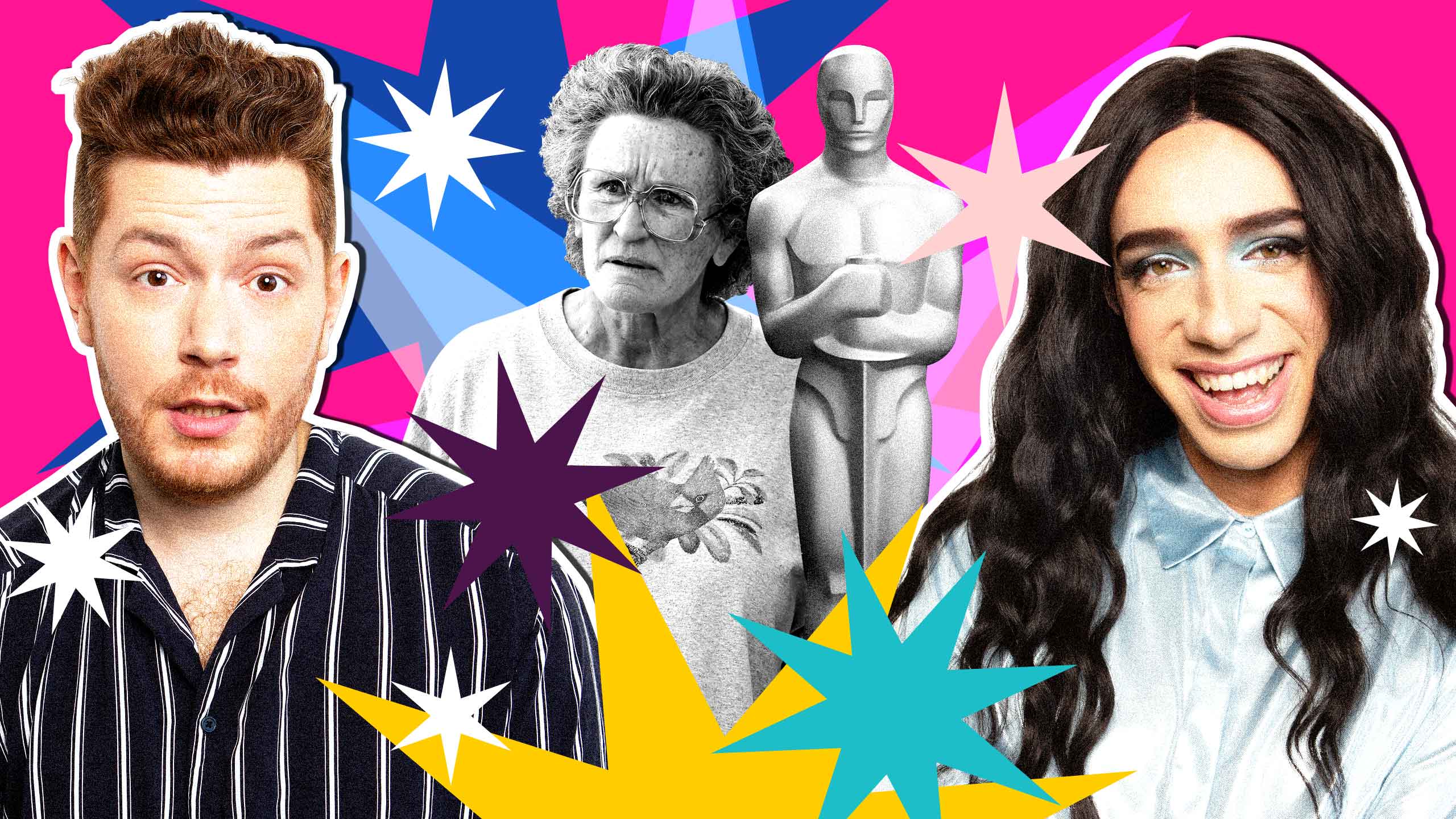Given the state of the world, it’s hard to believe award shows are still happening, but few things are as tenacious as a celebrity’s need for the spotlight. So here we are: Award season 2021! Does anyone really care? Has anyone even seen any of the nominated films or shows? What the hell is a Mank? And is there even room in our lives right now for anything celebratory?
Award shows are supposed to be a glamorous escape from the monotony of everyday life—the most alluring but impossible dream for anyone in show business. But, if you’ve seen any of the ceremonies so far, you’ll notice that this year the award shows have not been able to escape everyday life themselves.
“The Best Supporting Actress category is the most important category for queer people.”
Watching the stars accept awards from home on fuzzy internet connections through Zoom and seeing Beyoncé wear a mask as she sits in a socially distanced Los Angeles Convention Centre have killed the fantasy. The award shows this season have not exactly provided the kind of escapism we’re desperate for. Instead, they’ve mostly been awkwardly painful reminders of how bizarre everything is right now.
But maybe the Oscars can change this? They are undoubtedly the main event—Hollywood’s biggest, most glamorous night. And this year, the Best Supporting Actress category (the most important category for queer people) is more competitive than ever, with Glenn Close getting another shot at the Oscar that has alluded her for over 40 years.
As two people who’ve watched almost every award show over the last two decades, we have always been deeply (and stupidly) invested in the announcement of the winners, the moments of emotional glory, the snubs, the fashion—but this year is different, and that can’t be ignored. As we break down the highs and lows of award season 2021 and brace ourselves for the mystery of this year’s Oscars, can we still find meaning in Hollywood’s problematic illusions? Or has the illusion been permanently shattered?
Thomas: We did it, Hollywood…. We are now one month away from the 93rd Academy Awards! Tranna, are you excited?
Tranna: For the first time in my life, I am not. I don’t think I’ll even be watching it and I haven’t missed an Oscars ceremony since I was five years old. Growing up, the Oscars were such a big deal in my household—it was an event. I remember being the entertainment expert at my elementary school. The day after the Oscars, I’d be in the schoolyard telling everyone who won and who looked the best, breaking it down for the other children who probably didn’t even care.
Thomas: Every year, I defend the queers’ obsession with awards season, telling my hockey-loving straight allies that the weeks between the Golden Globes in early January and the Oscars in late February are like the Stanley Cup playoffs to us. They feign understanding, but I know that deep down they don’t. In a global pandemic and after a year of exhaustingly infuriating news, even I can’t muster any enthusiasm for award shows.
Tranna: Collectively, I don’t think award shows have done a great job of adapting. The Golden Globes were largely a disaster because it was basically a group Zoom chat, and we are all so unbelievably tired of Zoom. Nobody wants to watch something that looks like their work Zoom meetings. Tina Fey and Amy Poehler did a great job hosting, but you could tell their feeling was, “Why the fuck are we doing this? This is pointless.” We’ve all been living in sweatpants and hoodies; we are starved for glamour! And the award shows this season have not been able to give us that. The whole point of them is the spectacle of the gathering: The red carpet, the paparazzi and the fans in the stands going bananas, the fashion, all of the world’s biggest stars in the same place at the same time, the opulence, that buzz in the air. Without all of that, it’s just so unappealing.
“We’ve all been living in sweatpants and hoodies; we are starved for glamour!”
Thomas: Usually the Grammys are the worst of all the award shows, but this year they actually did a great job, especially in comparison to the Golden Globes. One award show had to be the first one to bring nominees physically back together, and the Grammys was it. Having Beyoncé and Taylor Swift on a rooftop sent a strong message: Life goes on. Celebrities celebrating celebrities—what a concept.
Tranna: The Grammys actually gave us a show! They gave us a spectacle, and that’s exactly what we needed—even though it’s hard to call what we saw at the Grammys an award show (it was really more like a concert or variety show). Megan Thee Stallion and Cardi B were obviously the standouts. I love how “WAP” continues to outrage American, religious, hypocritical, right-wing lunatics. We’ll see if the Oscars can top the Grammys, but even pre-COVID-19, the Oscars have been struggling to remain relevant.
Thomas: The great frustration in following the Oscars over the years is that the show feels like a parent who’s trying very hard to stay current, but often is just unable to keep up with the times. The Academy sometimes gets it right (Parasite), but most often they get it incredibly wrong (Green Book and Argo). But the frustration also fosters pleasure, since another pastime for the queers is to roast the show for days! For now, people are cautiously optimistic because the 2021 class of nominees is the most diverse it’s ever been: Two women are nominated for directing in the same year (a first!) and nine out of 20 people in the acting categories are BIPOC. This is great progress when you think that in 2015 not a single person of colour was nominated for acting and that last year no woman was nominated for best director.
The #OscarsSoWhite campaign was an important moment in the fight for representation, but also a reminder of the (white) media’s naiveté for thinking that racial justice was mostly about who got nominated for awards. Thankfully, the rules have changed, and now the voting body is more diverse than ever. It’s fascinating how, sometimes, Americans demand more accountability from an industry group (in this case, the Academy of Motion Pictures Arts and Science, which organizes the ceremony) than they do their political leaders.
Tranna: It is great to see that the #OscarsSoWhite campaign actually had an effect, and hopefully it will be long-lasting. But I’m always weary and a bit cynical: I feel like when there’s a backlash or controversy, corrective measures are taken but then forgotten a year later, and there’s a regression into old habits. In contrast to the diversity of the Oscar nominees this year, the Golden Globes could not have done a worse job on that front. Snubbing I May Destroy You? The nerve! But then, of course, it came to light that, currently, among the entire voting body of the Hollywood Foreign Press, there is not a single Black journalist.
The only good thing about the Golden Globes was getting to see Jodi Foster, at home, kissing her wife, Alexandra Hedison. Finally! I don’t know Jodie’s story too well, but she’s lived a pretty closeted life in the public eye, so it was great to see her be able to just be herself. That’s something we might not have gotten to witness if the Globes were happening as usual. But don’t ask me what Jodie was even nominated for—I feel so lost when it comes to the nominees this year. Not being able to go to actual movie theatres, I’m just so out of the loop! A lot of the nominees are not available on streaming platforms, or you have to spend $20 to watch them, and I’m not doing that.
Thomas: I have to admit that I, too, am so behind on watching the nominated films. I hadn’t even seen David Fincher’s Mank until last night! In a normal year, I would have seen it the weekend it came out, but obviously I have no mental bandwidth for new movies at the moment. Set in the 1930s and ’40s, Mank tells the story of an alcoholic screenwriter played by Gary Oldman who is commissioned to write the script for Citizen Kane. It’s like Ryan Murphy’s Hollywood for film bros: Film studies porn disguised as high art.
Tranna: That sounds so exhausting. I’m sorry but people need to stop trying to make Mank a thing. The title alone is so unappealing. I’d rather have a wank than watch Mank. The best thing David Fincher has ever done remains Madonna’s “Vogue” music video.
Thomas: It’s not that Mank is a bad watch, but these movies about “Old Hollywood” (whatever that means) are simply made for Oscar buzz. There’s not a lot of meat there, apart from blatant nostalgia and a boring political storyline about power in Depression-era California. I doubt that anyone will really care enough to remember Mank five years down the line. At least with recent best picture winners like Moonlight or Shape of Water, movie-going audiences had to acknowledge these were good works of art. Mank is just an okay Netflix watch dripping with gorgeous costumes worn by Amanda Seyfried and shot in HD black and white. And I’m so used to my queer media diet that any work without a bone thrown to the gays just bores me to death (no, Seyfried’s character Marion Davies doesn’t count).
Speaking of bones thrown to queers, this line in the now-viral letter sent to Oscar nominees sounds like it was written by Dan Levy for Schitt’s Creek matriarch Moira Rose: “You’re wondering about the Dress Code (as well you should). We’re aiming for a fusion of Inspirational and Aspirational, which in actual words means formal is totally cool if you want to go there, but casual is really not.” (Seriously, read that sentence with Catherine O’Hara’s voice. You’re welcome.) This is true allyship: Making sure we get to chuckle at stylists’ awkward interpretation of “inspirational and aspirational.”
Tranna: That letter is already more iconic than any Academy Award-winner. That line is a veiled threat: “If you dare even think about wearing sweats to the Oscars, we will hunt you down.”
Thomas: One rare positive aspect of the pandemic is that we are now much faster to say, “No, this doesn’t work for me.” Keeping up appearances and pretending we can endure everything is so 2019. That’s why this award season is exciting: These shows, most of them the least relevant they have been in a generation, are blowing up traditions, and that’s actually refreshing.
Tranna: We can’t talk about queerness and the Oscars without talking about the Best Supporting Actress category, which is the gayest one. I don’t know when or how it happened, but I love that we have claimed that category as our own, and this year it’s a thrilling showdown. Awards season 2021 is really all about this category; this is the main event. Glenn Close is nominated for the seventh time, for Hillbilly Elegy. Everyone thought she was finally going to win her Oscar for The Wife at the 2019 ceremony, but Olivia Coleman snuck out of nowhere and snatched it. The kicker is that they are facing off again!
“How many more chances is Glenn Close going to get to win her Oscar?”
Olivia is also nominated this year for Best Supporting Actress for her performance in The Father. Can you imagine if she beats Glenn again? How many more chances is Glenn going to get to win her Oscar? I do not care why they give it to her, I do not care if this movie is good or not, they just need to give her the damn award! She has given us some of the best, most iconic performances of our lifetime. It makes no sense that Marcia Gay Harden has an Oscar but Glenn Close doesn’t. This cruel losing streak needs to come to an end now! I won’t be able to handle it if Glenn loses again.
Thomas: Glenn Close deserves to have “Academy Award-winner” added to her name wherever she goes! One reason why I do love the Oscars is that, for one night, I believe that anything is possible. Hard work pays off! Art can sometimes win over business! (I’m being naive, I know!)
Tranna: I feel that, too! For me, watching award ceremonies is about living vicariously through the stars. When someone I love wins, it feels like I’ve won (I guess that’s what sports fans feel when their team wins, but I do not want to debase the arts with a sports analogy). The Oscars represent my ultimate fantasy of stardom. As frivolous and essentially pointless as awards are, there’s something so beautiful and almost sublime about watching someone’s dream come true. Obviously, it is my biggest dream to find myself in that moment one day, which is so embarrassing to admit!
The perfect example of that dream-come-true moment is eight-year-old Alan Kim, who won a Critic’s Choice award for his performance in Minari. It was hands-down the highlight of this year’s awards season, and I don’t think it can be beat. It melted my heart and obviously made me cry. (I’ve cried at least once during every Oscars ceremony I’ve seen.) But this year is just so strange. Can you imagine you’ve dreamed of winning an Oscar your whole life, you’ve worked yourself into the ground to get there and it actually happens—but it’s on Zoom?! I would be crushed.
Thomas: Okay, writing this has actually made me excited to watch more Oscar-nominated movies before the ceremony on Apr. 25. I have a lot of homework to do!
Tranna: I will not, nor will I ever, watch Mank.
Montreal-based comedians Thomas Leblanc and Tranna Wintour’s podcast Chosen Family streams on CBC, Apple and Google; new episodes drop every Thursday. Check out their new monthly video column for Xtra called Lucky Stars, highlighting how our fave queer icons exemplify their astrological signs.



 Why you can trust Xtra
Why you can trust Xtra


